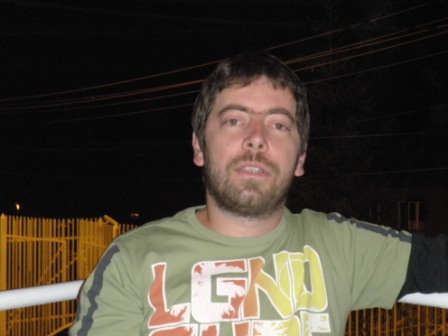|
|
 |
Sokol Kursumlija
Association for Peace Kosov@
| |
|
|
|
. |
|
| |
|
|
| |
Sokol Kursumlija, a guy from the Northern part of Kosovska Mitrovica, is the director of the local NGO Association for Peace Kosov@ (AFPK). He was appointed to this position by his colleagues, Advije and Naser. As he says, the main reason for that – language skills: “The person in charge needs to speak good English”. Therefore, he is the main contact person for AFPK as well.
|
|
| |
Together with his mates, Sokol has been involved in a very broad scale of activities in Mitrovica and its surroundings. For instance, the guys have been working on civil campaign “Stop the violence in Mitrovica”. They have greatly contributed to a children’s drawing exhibition, related to nonviolence. AFPK has also organized a theater for the adults and a concert for the youth, besides, it has provided some people with trainings, related to peacebuilding. However, these are only extra activities performed by AFPK. Initially, the NGO has been committed to promote peaceful coexistence among three main ethnicities in Kosovo: Serbians, Albanians and so-called RAE (Roma, Ashkali, Egyptians). “Unfortunately, after unexpected outburst of violence in March 2004, AFPK has lost the possibility to involve all of them into common activities”, says Sokol. Therefore, AFPK has switched its focus mainly on one community – Roma. |
|
| |
Currently AFPK has been also involved in a project with ICP. The aim of it is to improve the situation of the milk sector within two main communities of Kosovo and to stimulate cooperation between them based on shared problems as well as common interests and efforts to solve them. Sokol admits that it is something very new for him: “It is the first time that I am working on a project related to economical development and peace building at the same time”. However, he counts mainly on the first one. “After ten years of division people still do not trust their neighbors, let alone those who are living on the opposite side of divided Mitrovica”, he explains his skepticism towards the peace-building side of the project. On the other hand, Sokol points out, that everything depends on the people involved in the project. “But we cannot force them to cooperate; otherwise they will quit the project”, he adds. |
|
| |
Though, a lot of work has been made in the field of peace building, Sokol says that it is not so easy to implement projects. He explains that the result of their efforts often depends on the particular situation on the field. When the situation is very bad, NGO’s efforts are more visible. Besides, “When it is calm, it is very difficult to find funds”, Sokol clarifies. He also notices the role of international involvement in Kosovo, but with the mixed feelings towards it. According to him, international involvement depends from one person to the other, from one organization to the other: “Some organizations come just to make their job, some come with sort of early prejudices and believes, but after a while they change them and start working with a sense”. Yet many organizations for him seem to be biased. “I think it is not the best way to implement project, does not matter which side they support”, he says. |
|
| |
Dealing with all those issues makes Sokol to admit that he is getting a bit tired: “I have been working in this field for five years, I need a rest”. He explains that first of all he is an architect and he would really like to take a chance to do this job. But even if he succeeds, Sokol promises to stick to peace-building activities in Mitrovica, as long as he has at least some free time. He says that working with AFPK has brought him not only money or satisfaction of ‘being a boss’, but also some joy when he sees his efforts bringing a smile for a child. |
|
| |
However, Sokol realizes that few people cannot change the whole situation; therefore he is a bit skeptical about the future of Mitrovica. He expects someone to come up with a nice idea, how to solve all the problems. But in the meantime, Sokol sees only two options: separation of Kosovo or membership in EU for both Kosovo and Serbia. Yet in a case of the first option, some fears about Serbian enclaves in Southern part of Kosovo remain, while in a case of another possibility, some uncertainties about any real change occurs. “This is not a question of border; this is a question of living together”, Sokol explains his doubts. Thus, he is waiting for some rational suggestions to come. |
|
| |
Written by Vitalija Kolisova |
|
| |
|
|
| |
|
|
| |
|
|
| |
|
|
| |
|
|
| |
|
|
| |
|
|
|